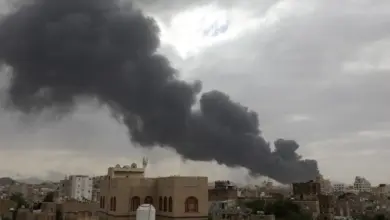Yemenis began voting on Tuesday to replace President Ali Abdullah Saleh in an election many hope will give Yemen a chance to rebuild the country shattered by a year-long struggle that had pushed Yemen to the brink of civil war.
Although Vice President Abd-Rabbu Mansour Hadi stands uncontested as a consensus candidate, the election is billed as an attempt to help Yemen turn a new page on a president who ruled the country with an iron fist for 33 years.
The vote would make Saleh, now in the US for further treatment of burns suffered in a June assassination attempt, the fourth Arab autocrat to leave office in a year after revolts in Tunisia, Egypt and Libya.
Large lines formed early in the morning outside polling stations in the capital Sanaa amid tight security, after an explosion ripped through a voting center in the southern port city of Aden on the eve of the vote.
"We are now declaring the end of the Ali Abdullah Saleh era and will build a new Yemen," Yemeni Nobel Peace winner Tawakkul Karman said as she waited to cast her ballot outside a university faculty in the capital Sanaa.
Voters dipped their thumbs in ink and stamped their print on a ballot paper bearing a picture of Hadi and a map of Yemen in the colors of the rainbow.
A high turnout is crucial to give Hadi the legitimacy he needs to institute changes outlined in a power transfer deal brokered by Yemen's Gulf neighbors, including drafting a new constitution and restructuring the armed forces, in which Saleh's relatives hold key positions.
The vote is backed by the US and Yemen's rich neighbors led by Saudi Arabia, who sponsored the peace deal signed in November allowing Saleh to hand over power to Hadi.
A pickup mounted with anti-aircraft guns and full of soldiers stood by another Sanaa University department as hundreds of men lined up to vote.
"It's the end of the tyrant and hopefully the tyranny of his family," Ziyad al-Qitwi, 21, said. "This is the fruit of a year's worth of revolution."
The election leaves unresolved a military standoff between Saleh's relatives, a mutinous general and gunmen loyal to tribal notables. There is an armed revolt in the north of the country and a secessionist movement in the south where Islamists accused of links to Al-Qaeda have also made advances.
It was not clear who was behind Monday's violence. But separatists are demanding a divorce from the north with which they fought a civil war in 1994 after formal political union in 1990.
Southerners, who accuse the north of usurping their resources and discriminating against them, have said they will boycott the election because it confers legitimacy on a political process to which they were not party.
That prospect threatens to strip any legitimacy from the power transfer plan crafted by the Gulf Cooperation Council, with US backing, which enshrines Vice President Abd-Rabbu Mansour Hadi for a two years in order to draft a new constitution and hold multi-party elections.
The vote has been denounced in advance by youth activists who took to the streets to demand the end of Saleh's 33-year rule, and regard the transfer plan as a pact among an elite they regard as partners to the crimes of Saleh's tenure, including the killings of protesters in the uprising against him.
"The election is a political scenario mapped out in the GCC initiative but in its essence it is irrelevant to the true ideals of democracy," Rana Jarhoum, 29, a development worker, said.
Broken as Somalia?
Washington, which long backed Saleh as a foe of the Al-Qaeda branch that plotted abortive attacks abroad from Yemen, now backs transition to ensure it has a partner in its war against Al-Qaeda, which includes assassinations using drone strikes.
Its envoy in Sanaa, Ambassador Gerald Feierstein, on Monday claimed Shia Muslim Iran was fomenting unrest in the northern provinces where Saleh's forces tried and failed to crush Shia rebels. This echoed the accusations of Sunni-led monarchies neighboring Yemen that Tehran seeks more regional influence via a Shia fifth column.
He also called for reuniting a military in which Saleh's son Ahmed Ali and nephew Yehia lead key units that have enjoyed US support. They are locked in a stand-off with tribal leader Sadeq al-Ahmar and dissident General Ali Mohsen, whose battles with Saleh's loyalists have left parts of Sanaa in ruin.
Hadi alluded to these rifts in a message to the nation hours before the vote, warning they must be healed to steer Yemen away from becoming "as fragmented, splintered and destroyed as Somalia."
"We cannot talk about a stable nation without returning life to its natural state and removing the phenomena which have appeared, beginning with the split in the army."
The interim government faces a fiscal and humanitarian crisis, and has sought billions of dollars in international aid to avoid collapse in a country where unrest has all but paralyzed modest oil exports that fund imports of staple foodstuffs.
The IMF estimated Yemen's forex reserves dipped to US$2.7 billion last year, and the United Nations Children's Fund says 57 percent of Yemen's 12 million children are chronically malnourished — the highest level outside Afghanistan — and that half a million face death or disfigurement.



